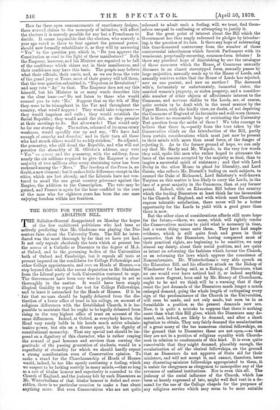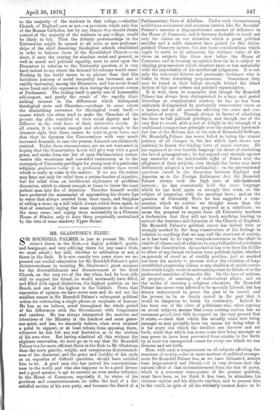THE HOPES FOR THE UNIVERSITY TESTS' ABOLITION BILL. T HE Solicitor-General
disappointed on Monday the hopes of the few embittered politicians who had been so actively predicting that Mr. Gladstone was playing the Dis- senters false about the University Tests. The Bill he intro- duced was the most thorough by far that we have yet had. It not only repeals absolutely the tests which at present bar the access of a Catholic or Dissenter to the degree of M.A. at Oxford, and to the governing bodies of the Universities both of Oxford and Cambridge, but it repeals all tests at present imposed on the candidates for College Fellowships and other College appointments, and even on Heads of Houses,—a step beyond that which the recent deputation to Mr. Gladstone from the Liberal party of both Universities ventured to urge. The Government have been very wise in preferring to act so thoroughly in the matter. It would have been simply illogical timidity to repeal the test for College Fellowships, and to leave it untouched for the Heads of Houses. H it be fair that no man should be legally debarred from the dis- tinction of a lower office of trust in his college, on account of religious differences with the Established Church, it is im- possible to maintain that he ought to be legally debarred from rising to the very highest office of trust on account of the same differences. Indeed, at Oxford, as everybody knows, the Head very rarely holds in his hands much active adminis- trative power, but sits on a throne apart, in the dignity of constitutional monarchy. That any special test should be im- posed on a dignitary of this character, who is rather reaping the reward of past honours and services than earning the gratitude of the passing generation of students, would be a superfluity of absurdity for which we should hardly expect a strong manifestation even of Conservative opinion. To make a stand for the Churchmanship of Heads of Houses would, indeed, be too like openly confessing a feeling, which we suspect to be lurking secretly in many minds,—that so long as a sort of titular honour and superiority is conceded to the Church of England, and the jealousy felt by such Dissenters as Mr. Winterbotham of that titular honour is defied and over- ridden, there is no particular occasion to make a fuss about anything more. But even Conservatives who are not quite ashamed to admit such a feeling, will, we trust, find them- selves unequal to confessing or attempting to justify it.
But the great point of interest about the Bill which the Government has thus amply redeemed its pledges by introduc- ing, is the question of its fate. Is there any hope of subtracting this time-honoured controversy from the number of those controversial inheritances which furnish Parliament with its. wearisome, perpetually-recurring, common-form debates ? Is. there any practical hope of diminishing by one the catalogue- of those measures which the House, of Commons annually discusses in an almost stereotyped form, annually passes by large majorities, annually sends up to the House of Lords, and annually receives notice that the House of Lords has rejected, now on one pretext, and now on another? The deceased wife's, fortunately or unfortunately, immortal sister, the- married women's property, or stolen property, and a consider- able number of other objects of affectionate interest to the- Commons, and nervous dislike to the Lords, are, of course, quite certain to be dealt with in the usual manner by the- Upper House, with the kindly view, no doubt, of not depriving the Commons of England of its favourite and well-worn themes.. But is there no reasonable hope of extricating the University Test question from the midst of these ? We take courage to that there is,—partly from the tone taken by the- Conservative chiefs on the introduction of the Bill, partly from certain considerations which must just now be present to their minds with more than usual force, of the danger of rejecting it. As to the former ground of hope, we can only say that Mr. Hardy and Mr. Walpole, in the very few words. they said, spoke like men who rather hoped to attenuate the- force of the reasons accepted by the majority as final, than to inspire a successful spirit of resistance ; and that with Lord. Derby in the other House to plead for liberality, and Lord Cairns, who reflects Mr. Disraeli's feeling on such subjects, to. counsel the Duke of Richmond, Lord Salisbury's well-known Toryism on this matter is less likely to carry the Lords, in the face of a great majority in the Commons, than at any former period. Indeed, with an Education Bill before the country which the leading Dissenters at least think far too favourable- to the Church of England, and with which most Churchmen express tolerable satisfaction, there never will be a better• opportunity for the Lords to yield with a good grace than there is now.
But the other class of considerations affords still more hope- for the future,—those, we mean, which will rightly render- the Conservatives anxious to yield what is necessary in time, lest a worse thing come unto them. They have had ample- evidence, which is still quite fresh and green in their memories, that the Dissenters, having conquered most of- their practical rights, are beginning to be sensitive, we may almost say dainty, about their social position, and are quite as intent on reforming the fashions which favour the Church, as on reforming the laws which oppress the conscience of Nonconformists. Mr. Winterbotham's very able speech on the Education Bill, and his effective attack on the Bishop of- Winchester for having said, as a Bishop, of Dissenters, what no one would ever have noticed had it, or indeed anything- much more flagrant, been said by Mr. Binney of Churchmen,. ought to be and we think will be a warning that if they resist the just demands of the Dissenters much longer a much, enlarged demand, going the whole length of extirpating every sign of the predominance of the Church in the Universities, will soon be made, and not only made, but soon be in as. formidable a position as the present demands now are. Now, it is quite 'a mistake to suppose that there is nothing more than what this Bill gives, which the Dissenters may de- mand, and, indeed, are likely to demand, and after a short. agitation to obtain. They may fairly demand the secularization of a great many of the too numerous clerical fellowships, on the ground that to Dissenters these are not open,—so that they are not in a position of religious equality with Church- men in relation to emoluments of this kind. It is even quite- conceivable that they might demand, plausibly enough, the secularization of all the clerical fellowships, on the ground that as Dissenters do not approve of State aid for their ministers, and will not accept it, and cannot, therefore, have any dissenting-minister fellowships appropriated to them, it is unfair for clergymen as clergymen to monopolize any of the revenues of national institutions. Nor is even this all. The jealousy of the social influence of the Church, which has been so keenly expressed of late, might well find vent in a de- mand for the use of the College chapels for the purposes of any religious service which may seem to be most suitable to the majority of the students in that college,—whether Church of England men or not,—a provision which only fear of the Roman Catholics, lest by any chance they should obtain control of the majority of the students in any college, would be likely to foil. Then the divinity professorships in the Universities might be opened to all sects, or new professor- ships of the chief dissenting theological schools established in order to balance those of the Established Church ;—in short, if once the craving for absolute social and general, as well as moral and political equality, were to seize upon the Dissenters in relation to the University question, it is very hard indeed to say where the demand for reforms would cease. Nothing in the world seems to us plainer than that this fastidious jealousy of social inequality has increased, and is rapidly increasing, among the Dissenters, and has never found more frank and able expression than during the present session of Parliament. The feeling itself is partly one of honourable self-respect, and partly the result of the rapidly dimi- nishing interest in the differences which distinguish theological sects and Churches,—perhaps to some extent the diminishing reverence for theological truth itself,— causes which too often tend to make the Churches of the present day alike watchful of their social dignity and in- different to the vital force of their distinctive creeds. At all events, it is certain enough and obvious enough to the dimmest sight that these causes do exist in great force, and that they do threaten the Conservatives with very much increased demands, in case the present demands are obstinately resisted. Under these circumstances, are we not warranted in hoping that the Conservative Lords will give way with a good grace, and strike from the list of open Parliamentary contro- versies this wearisome and one-sided controversy as to the monopoly of University privileges for young men of a particular religious profession ?—for it is profession rather than creed which is really at stake in the matter. If we are, the nation may hope not only for relief from a serious burden of injustice, but for relief from an intellectual nightmare of profitless discussion, which is almost enough at times to throw the most patient man into fits of dejection. Tantalus himself would have preferred the amusement of approaching his thirsty lips to water that always receded from their touch, and Sisyphus of rolling a stone up a hill which always rolled down again, to that of constantly urging the same arguments in defence of the same cause, and urging them successfully in a Plutonic House of Shades, only to have them perpetually neutralized by the veto of some shadowy Upper House.



































 Previous page
Previous page